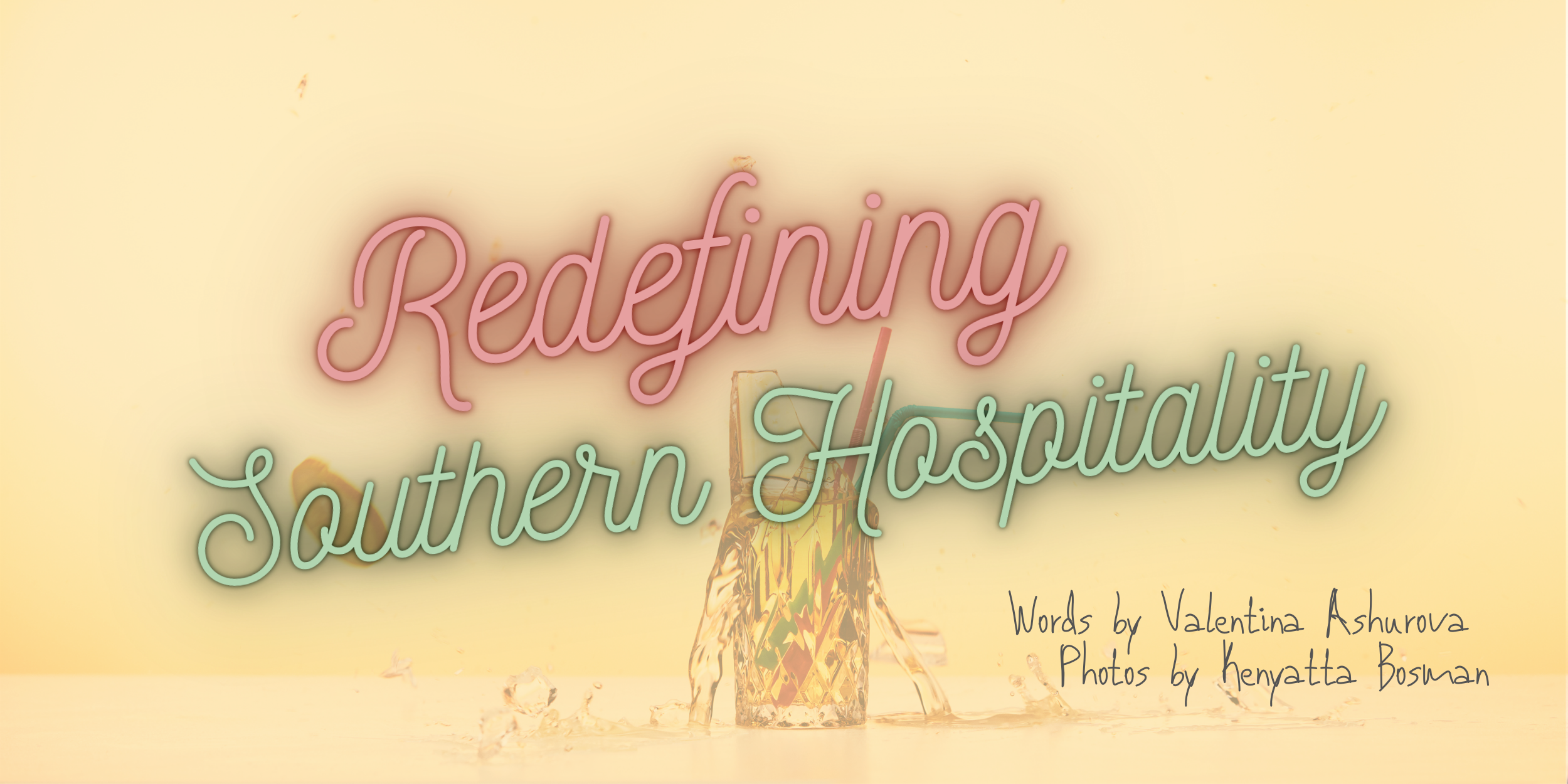
Within the first few years of our lives in the United States, I remember vividly my mother saying, “What a strange culture! The people walk by you in the stores, just smile at you when you see them, and then stop smiling and keep walking!” The funny thing was, for her, the most bizarre aspect was the smiling (because in my culture, well, they don’t necessarily smile at one another). But, for me, it was the pride in this interesting form of southern hospitality that I found unsettling. Was this the extent of the kindness of strangers? It felt so unnatural, so insincere . . . I yearned to know if it was truly authentic or if it was merely a facade?
When I think about this type of hospitality in Louisville, I think about how easily it appeals to tourists and wonder, What about the community? After all, what we boast about is what we have and what we have is a thriving food scene and bourbon accolades that transcend generations. An evening out in the city for a craft cocktail or even grabbing a bite for carryout during the pandemic requires careful deliberation that feels like it lasts hours and, for the folks that live here, the determining factor is so much more than just the where or the what; it’s the who that really brings us back week after week. new folks are constantly emerging in Louisville making strides in the food and bar scene, introducing most of us to the art that is their craft, but also to themselves. What many Louisvillians and tourists may not realize is that at the heart of this city are BIPOC creators redefining Southern Hospitality.
I have been constantly enamored by the dedication of those in the service industry and the many diverse folks currently leading Louisville’s dining and spirits world. However, the history of the service industry and the practice of “southern hospitality” has been deeply compounded by slavery. So much so that we forget why hospitality is specifically linked to the South, a region that willingly went to war to defend their enslavement of African Americans. For many years, the US restaurant industry has continued to be largely made up of people of color; commonly in the back of house, from marginalized communities, sometimes undocumented, and rarely in management positions. The first to arrive and the last to leave, they are the backbones of the industry.
Community Chef Heather Boyd
Support the HB Soulfood Creations GoFundMe.
Community chef, Heather Boyd, is the owner and head chef of HB’s Soulfood Creations. Heather, with 20 years of cooking experience under her belt, launched HB’s Soulfood Creations by first feeding her community and providing meals to Downtown Louisville during the COVID-19 pandemic. With food supplied by Black Lives Matter Louisville, Heather cooks 3 times a week solely for those that are in need of a hot, delicious, and nourishing meal. Heather does not require those in need to come to her – instead, she relieves this burden from the most disenfranchised members of our community by not just cooking these meals but also taking them directly to locations including 1st and Broadway to hand deliver as much as she can to every individual she can find. “I really thought the different non-profits like the Salvation Army were feeding people. But they’re not (feeding people), people are still out here and they’re hungry, and I definitely know there’s a need to feed people.”
Through Heather’s endeavor to feed her community during the pandemic, the demand for her Soulfood grew. She cooks in her very own kitchen; displayed on her fridge are tickets of orders for classic southern staples such as chitlins, simmered
mouth-watering oxtails with potatoes, and buttermilk fried chicken wings. Heather says, “People want good food - [they want] seasoned soul food!” Heather’s goal is to start up a mobile kitchen to accommodate her demand and also to travel between cities feeding under-resourced communities, “I bless taste buds - that is my purpose.”
Taco City Owner and Chef Oscar Estrada
With the pressure to re-open amidst a lack of resources in a pandemic, there lingered the stress of staying afloat for most restaurants in the city. For Taco City Louisville, it was quite the opposite. Oscar Estrada, along with his brother, Benigno, came to Louisville hoping to bring a Taqueria that was abundant in flavor and creativity. They took on the risk and snagged a location in Louisville’s popular Highlands area and, with a spacious deck perfect for sipping margaritas and food that speaks for itself, business began booming. When the pandemic hit, the Taco City team closed to regroup and figure out how to operate carry-out for their volume. Estrada says, “We actually called the health department like ‘Ok, you need to tell us what to do,’ and they answered with, ‘We don’t know what to do as well because this is totally new to us.’”
While many folks focused on profit, the Estradas prioritized keeping people safe - a pillar of what southern hospitality here has begun to look like. Taco City hired someone to maintain their capacity due to their high volume. Oscar aims to find ways to take advantage of their spacious patio during the pandemic and equip it for the cooler months.
Though the patio is large, the kitchen is tight for the volume that Taco City handles. To overcome their obstacle of a small fridge, Oscar and team buy fresh ingredients every day, which only enhances their flavor-packed menu. This team continues to tackle adversity head-on, no matter what 2020 has thrown their way; taking hospitality a step further with their connection to their customers. “In the beginning, we really struggled. And then people started to get to know us. We have some great customers here, and now we have a customer base and people come in 3-4 times a week!” says Estrada. Taco City even plans to open a second location in the Middletown area in the beginning of the year.
With Louisville’s expansion of the food industry comes the emergence of BIPOC-owned establishments, as a result, reframing what hospitality means to their own communities. Can this city move southern hospitality beyond its shameful history by elevating the folks' initially as its targets?



Felicia Corbett, Beverage Director and Master of Potions of Trouble Bar, challenges the facade of southern hospitality (that same hospitality my mother was so amused by) with a soul that never drops the smile. Felicia, one of two Whiskey Guardians for Angel’s Envy, can talk bourbon all day, and quite frankly, I could listen. Some of the biggest challenges Felicia has faced being in the industry for 15 years are the persistant misogyny and racism.
“Being a woman of color, it felt like there wasn’t a space for me. I remember one specific story where I was at the bar and a gentleman came up to the bar looking around asking for a bartender. I was literally standing with a bottle of wine in my hand like ‘That’s me,’ and he was like, ‘No, I need to talk to somebody who knows how to make cocktails,’ and I responded, ‘I created this entire cocktail list.’ Then he said, ‘I’ll take a coke.’”
This is such a memorable experience, yet not uncommon for Felicia, as a talented and wildly qualified spirits professional often overlooked behind the bar for being both Black and a woman, Felicia continues to push through these obstacles by educating herself and others on her craft. Certified as an Executive Bourbon Steward, an Angel’s Envy Whiskey Guardian for 5 years, Felicia has been to every distillery “at least twice.” Her passion and resilient energy speaks for itself and, having fought two rounds of cancer, nothing can get in the way of her passion to bring this community together. Felicia wants nothing more than to see the industry be successful together and make it through the pandemic, “We have to bring hospitality back by working together. We need to stop being divisive.”
Felicia pushes for ways to bring wellness resources to the community while connecting and uplifting one another during times that may be challenging to our mental health. In addition to redefining hospitality with her focus on positivity and wellness, Felicia is working on a book of cocktails with her own shake and twist, “Being a bartender is not hard. But being a great bartender has nothing to do with setting shit on fire or how you cut your apple slices. It has to do with your connection with the person on the other side of the bar and, with COVID, that’s even harder.” Though that may be, people continue bellying up to her bar [Editor’s Note: Metaphorically speaking. Trouble Bar has not allowed patrons to sit at their bar during the pandemic.] thanks to her inviting energy, her sense of comfort, and the way she redefines what hospitality looks like: through passion, optimism, and through showing up as her unapologetical self.
In times of turmoil, communities that may not have much have each other. The extent of the kindness of strangers reaches one another until we don’t feel like strangers anymore; unlike those grocery store smiles troubling my mother, the smiles in these communities grow to be genuine, familiar, and warm. Each connection continues to cultivate another and it feels like you never want to leave. Patrons greet each other as if long time friends, kitchen staff waves with familiarity, and bright eyes peer over a car window with a piping to-go box in hand crafted straight from the heart. This is Louisville as it should be, hospitality as it should be, a notion that ripples through lifting one another up -- especially in uncharted waters. And just maybe, the rest of the city will see it, too.
Valentina Ashurova (she/they) is a writer based in Louisville, KY. Through her personal experiences as a Jew-ish and queer immigrant of color in the United States, Val aims to push for a more diverse Louisville.
She also likes to talk with her hands. A lot.
Kenyatta Bosman is a contemporary artiist and healer born and raised in Louisville, Kentucky. Their work is centered around ancestor veneration and offers various services from photography to Reiki healing, chakra alignment, sounds baths, and tarot reading.





